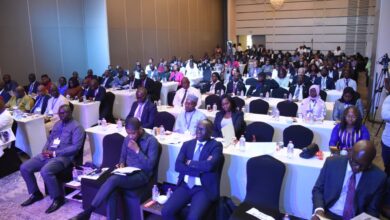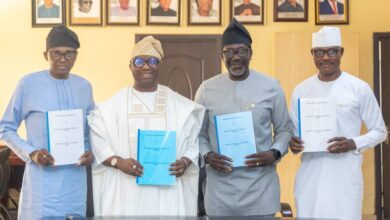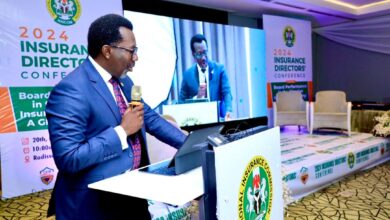Nigerian Insurance industry struggling for growth amidst challenges
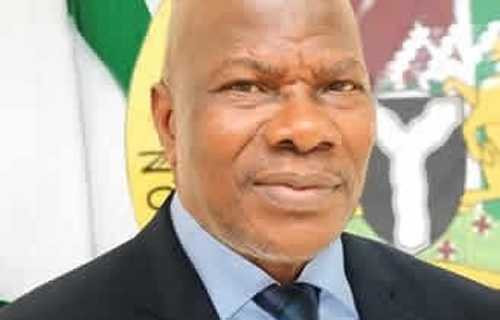
NAICOM Boss, Mr. Olorundare Sunday Thomas
Over the years Nigerian Insurance industry has continued to struggle for growth amidst diverse challenges despite the government reforms, the nation’s high population and other potentials. In this article, EDET UDOH highlights some of the challenges the industry is facing, its effort to chat growth paths, and the way forward.
Development of insurance in Nigeria
Development of insurance took place long before Nigeria became an independent country. Since that period, Nigeria has overcome a long path filled with different changes and challenges. Insurance in Nigeria can be traced back to the 20th century when Nigeria’s economy was solely dependent on agriculture. There was a need for merchants to transport their cash crops to Europe and also reducing the risk of such transportation. This majorly contributed to the dominance of marine insurance in Nigeria at that time.
Many years after, the evolution of insurance became more and more visible, though, in comparison with other world countries, insurance in Nigeria is developing quite poorly. The reasons for this come not only from insurance services but also from a combination of factors which this article will highlight.
How Insurance Industry is structured
The Nigerian insurance industry players are structured into four players: insurers and reinsurers, insurance brokers, agents and loss adjusters. The insurance and reinsurance companies underwrite risks while the insurance brokers and agents act as intermediaries between the underwriters and the policy holders in the sale of insurance products and the collection of premiums. The loss adjusters, on the other hand, determine the appropriate valuation of the loss incurred in the event of a claim. Brokers are thought to control about 70% of all insurance premiums in Nigeria.
Insurance Industry Performance
Before delving into other issues in the industry, let’s first of all take a look at the industry performance in line with 2019 and 2020 financial reports.
According to Agusto & Co’s estimates for the 2019 financial year, the Insurance Industry in Nigeria generated gross premium income (GPI) of ₦471 billion, approximately 12% higher than the preceding year’s GPI. Major growth drivers were the regulatory support through inclusive insurance initiatives such as bancassurance, slightly improved macroeconomic fundamentals following a rebound from a recession, the commencement of major infrastructural projects and an increasing awareness of the benefits of insurance.
National Bureau of Statistics (NBS), in its report said the insurance sector contracted by 28.15 per cent in the second quarter of 2020.
The NBS disclosed this in its Gross Domestic Product (GDP) report for the second quarter of 2020.
The bureau stated that the finance and insurance sector consisted of two sub-sectors, namely financial institutions and insurance, which accounted for 89.82 per cent and 10.18 per cent of the sector respectively in real terms in Q2.
Part of the report read, “As a whole, the sector grew at 20.82 per cent in nominal terms (year-on-year), with the growth rate of financial institutions as 30.94 per cent but –28.15 per cent growth rate recorded for Insurance.
“The overall rate was higher than that in Q2 2019 by 19.85 per cent points, and lower by –3.14 per cent points than the preceding quarter. Quarter on quarter, growth was 0.49 per cent.
“The sector’s contribution to aggregate nominal GDP was 3.76 per cent in Q2 2020, higher than the 3.03 per cent it represented a year earlier, and higher than the contribution of 3.57 per cent it made in the preceding quarter.”
Growth in the sector in real terms totaled 18.49 per cent, higher by 20.73 per cent points from the rate recorded in 2019 second quarter, but down by 2.30 per cent points from the rate recorded in the preceding quarter.
NBS said Quarter on quarter, growth in real terms stood at –0.16 per cent.
The contribution of finance and insurance to real GDP was four per cent, higher than the contribution of 3.17 per cent recorded in the second quarter of 2019 by 0.83 points, and higher than 3.81 per cent recorded in Q1 2020 by 0.20 per cent points.
Some Identified Challenges
Some factors identified militating against the industry growth that need to be tackled to ensure the growth of the industry include lack of adequate government support, poor regulation, lack of constitutional backing, negative public perception about the industry, inadequate data, poor pricing of the industry’s product (rate undercutting) and unwholesome practices /unhealthy competition among the industry players.
Low capital base, harsh economic environment, poor service delivery, delay in claim settlement, non-enforcement of compulsory insurances, lack of technical expertise in the area of high profile risks such as marine, oil and gas and aviation, excessive discount, impact of COVID -19 and EndSARS protest.
Other reasons, identified as hindrances to the industry’s growth are lack of awareness/low penetration, religious/cultural belief, poor capacity to handle high profile risk leading to ceding of such risks abroad, lack of acceptable product that meets the needs of the people, dilapidated infrastructure leading to increased cost of operations, inability to deploy technology to drive operations, high taxation and inadequate channels of distribution, disagreement between regulatory authority and the industry’s shareholders on issues of regulatory framework especially recapitalization amongst others. Hereunder, we will try to examine some of the problems and their effect on the industry.
Weak Regulatory Framework
The regulatory framework for insurance is very weak. National Insurance Commission (NAICOM) is empowered to ensure the effective administration, supervision, regulation and control of insurance business in Nigeria and is governed by the Insurance Commission Act 1997 and Insurance Act 2003. The insurance industry in Nigeria is still growing and developing.
Historically in Nigeria, government policies and legislations were made concerning insurance industry simply to whittle down foreign dominance in the industry. There is an urgent need to review the laws regulating the Insurance industry. The Marine Insurance Act, 1961 is clearly outdated as it was a verbatim reproduction of the Marine Insurance Act 1906 of the United Kingdom (UK) which has been reviewed in the UK.
There is also a need for policies making some insurance products compulsory and mechanism to ensure full implementation of such policies. More stringent policies to retaining more local content in some special risk such as aviation and oil & gas must be made by the legislators and National Insurance Commission.
Another major problem is National Insurance Commission inability to ensure that there are standard premium rates on certain insurance products. Insurance companies must adhere to the policy such that there is a benchmark for rates when negotiating premiums. But in 2019 NAICOM came up with minimum rate that should be applied in Group Life Insurance product. This has brought a lot of sanity in the Group Life Policies and the players have adopted the rates as stipulated by NAICOM.
Speaking at the occasion of the Inauguration of Retail Insured Family Association of Nigeria (RIFAN) on “The Challenges of Insurance Industry in Nigeria and the Way Forward,” Dr Sam Chukwuka Onyeka, condemned the prescriptive legal framework as militating against the industry growth.
He expressed sadness that “the challenge posed by legal framework. By nature, the extant legal framework for insurance business, the Insurance Act 2003 is prescriptive. By this I mean that the law does not allow the regulator to be innovative or make any changes without reference to the National Assembly. The international best practice standard for legislation is to make it mainframe approach. This means that the legislature puts the law in a mainframe and allow the regulator through regulations and guidelines to fill in the details based on the dictates of times and environment. The banking sector has met this standard in Banks and Other Financial Institutions Act (BOFIA), 2020. The Pension Industry has done the same in the Pension Reform Act 2014.”
“The prescriptive legal framework is the main reason the insurance is not moving anywhere. This challenge must be addressed with all the capacities the industry can muster. Take for example, the current proposal for Tier-Based Minimum Solvency Capital (TBMSC). The proposal is a good one, but it can never be implemented under the Insurance Act 2003. The Insurance Act allows increase of minimum capital across the board (Section 9 (4)), but not solvency margin. Solvency margin for non life business is fixed across board at 15% of Gross Premium or the amount of minimum capital without making any room for increase by NAICOM (Section 24).
“Similarly NAICOM has proposed to introduce with effect from January 2019, State Insurance Producers (SIPs). By this model, the insurance regulator intends to licence some state institutions as insurance agents. By this the insurance regulator hopes to encourage the states to key into insurance business and thus further deepening insurance penetration in the country. Again while this proposal may be well intended but it may not work as the regulator has no authority in law to create SIPs. The conditions for licensing insurance intermediaries are specified under sections 34 and 36 of the Insurance Act 2003. You are either a broker or an agent. Section 34 does not envisage corporate agency. I recommend that NAICOM should encourage the states to take up Brokers licence (as it used to be) not corporate agency as they have proposed.”
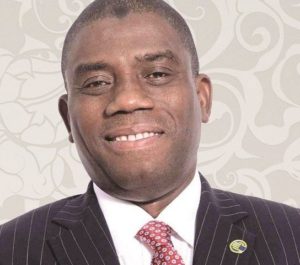
NIA Boss, Mr. Ganiyu Musa
Harsh economic Environment
According to industry analysts, “a stable economy promotes the savings necessary to finance investments which is a prerequisite for achieving a viable insurance industry which can help sustain economic growth. Insurance companies are sensitive to economic fundamentals and sometimes have to factor a lot of economic variables to make the right investment decisions. These variables include foreign exchange reserves, government debt, government deficits, inflation, interest rates and exchange rates which have all suffered in recent years as a result of Nigeria’s financial indiscipline and misappropriation.
“What this means is that for the insurance industry to thrive and attain its potentials, the government must be sincere in promoting a favourable environment that will allow the financial service industries to thrive. This will help increase the operational efficiency of the insurance industry.”
The Commissioner for Insurance, Mr Sunday Thomas, while speaking on how the environment can either hinder or enhance business growth said, “The potential of the insurance sector is huge. We have found ourselves where we are today not because of inaction by my predecessors but probably the environment was not too conducive to get certain things done. The environment changes from time to time. So, we are presently leveraging on a fairly good environment to see how fast we can run…”
Presently, insurance companies are unwilling to invest the premiums in long-term instruments because of the fear of inflation built up over several years due to fiscal indiscipline and high inflation. It is a very simple principle of economics and investment that short-term investment will yield lower returns. If these trends continue to occur, insurance companies will not be able to solve their liquidity problems which might deter insurers to pay claims.
Unwholesome Practices/Unhealthy Competition
Industry operators have been advised to be forward-looking in their competition in terms of service delivery and product rating, warning them against unhealthy competitions and practices inimical to the growth of the industry.
Industry analysts believe that apart from other unwholesome practices going on in the industry, unhealthy competition among underwriters, resulting in premium rate undercutting against prescribed or standard industry rates, is not the way to go in improving insurance growth in the country. Rather, creative and value-added insurance products that scale a sceptical public’s trust barriers to deliver positive customer experiences will deepen insurance penetration and impact positively on the overall growth of the industry. But the NIA Chairman, Mr Ganiyu Musa, while speaking on this issue, said the industry is doing everything within it powers to eradicate it.
Lack of skilled manpower
A recent survey by PwC a global network of firms delivering world-class assurance, tax, and consulting services for your business discovered that there is a need to engage professionals in some key management levels.
According to PwC, “Actuarial, risk management, capital management and underwriting skills shortages were noted during the survey. IT skills, or perhaps more appropriately digital skills, are also in demand as the industry attempts to keep pace with emerging technologies.
But to improve the industry’s skill set and increase the number of regulators, NAICOM has established Insurance Academy to train regulators in addition to the existing ones such as the Chartered Insurance Institute of Nigeria (CIIN). The Institute was established to provide world-class manpower with the highest standard of professional and ethical training for operating effectively and efficiently in the Nigerian and International business environment. This led to the establishment of the College of Insurance and Financial Management (CIFM) in 2010. The CIFM started its operations in 2010 under the Training Directorate of the CIIN but moved to its present campus on the 5th of January 2015.
According to CIIN Director-General, CIIN provides you with the tools required to excel as an Insurance professional in Nigeria and anywhere in the World. The Institute’s robust offerings stimulate intellectual growth along with logical reasoning in addition to promoting good corporate governance and the best ethical conduct.
“Since its inception, the Institute’s professional examinations have become the take-off board for outstanding professionals who have progressed to distinguish themselves in their various endeavours. As the body tasked with providing the human capital needs of the Nigerian Insurance Industry, the Institute’s dedication to promoting the ideals of professionalism remains unflinching and it will continue to exercise its statutory responsibilities as mandated by law and contained in Act NO. 22 of 1993 of the Federal Republic of Nigeria.
“Our accredited programmes carry high industry respect, are globally transportable and our learning environment is safe and comfortable. We are also continuously exploring opportunities to improve and expand our services to our members, just as we consistently review our curriculum to keep pace with industry developments and demands.”
According to NAICOM boss, Mr Sunday Thomas, “This will pump knowledge into the head of the staff. They will know of current developments and will be conversant with our responsibilities. We believe the Academy should be the game-changer.
“The Academy essentially is to train regulators, just as the market is bereft of human capital, we also have capacity issues. And so we found out it is cheaper for us to bring somebody from the United States and more developed insurance regulatory jurisdiction to train 20 or 30 people than to send 10 abroad. I think for us it is more economical and, above all, knowledge sharing continuously. So, it is one of these things we want to do as frequently as possible”

NCRIB President, Dr (Mrs) Bola Onigbogi
Impact of COVID-19
The insurance industry’s performance in 2020 was largely attributable to significantly lower levels of both domestic and international economic activity during the year, which resulted from nationwide shutdown efforts aimed at containing the COVID-19 pandemic.
The domestic efforts ranged from initial restrictions of human and vehicular movement implemented in only a few states to a nationwide curfew, bans on domestic and international travel, closure of schools and markets among others, affecting both local and international trade.
The Commissioner for Insurance, Sunday Thomas, had noted that this year has no doubt been a very challenging one for the insurance sector, individual households and the economy at large as a result of the COVID-19 pandemic. “However, to us in the insurance sector, what this situation has thrown up is that there must be a paradigm shift from our usual way of business practice. It is therefore imperative on us to embrace and align our businesses to the new world order if we must be seen to be relevant,” he said.
Aftermath of EndSAARS Protest
The EndSARS protest which took place in 2020 by Nigerian youths against police brutality which was later hijacked by hoodlums and area boys which led to the destruction of lives and properties is today hurting insurance companies with piled-up claims for settlement.
As of the end of April, insurance operators have paid N4 billion as claims benefits to over 2000 individuals and businesses that were affected during the #EndSARS protest.
The Chairman Nigerian Insurers Association (NIA), Ganiyu Musa, who disclosed this at an interactive session with insurance journalists in Lagos, noted that operators are still collating claims and every genuine claim will be settled.
According to him, “the number of insured businesses that were affected at the last count was about 2000 insured loss and the industry have settled over N4 billion claims in respect of the endears protest. Once they are documented and completed, we commit our members that claims will be paid timely.
“The association is on top of developments in the aftermath of the protests and will continue to encourage members to pay all genuine claims in line with the extant policies.”
Tax burden
Insurers are seriously complaining that the industry is over-taxed, which they said is affecting their profit and ability to make returns to stakeholders and shareholders.
Using their past five-year operation as an example, about 55 life and non-life insurance companies in Nigeria have paid N36.5 billion taxes to the federal government through the Federal Inland Revenue Service (FIRS). The taxes were paid by the companies between 2013 and 2017 financial year-end.
Data obtained from the Nigerian Insurers Association (NIA) showed that insurance companies generated N100.4 billion as Profit Before Tax (PBT) and were left with Profit After Tax (PAT) of N63.9 billion, having paid N36.5 billion as taxes to the government. The tax paid translates to about 35 per cent of the profit made within the period under review by the firms.
Apart from paying taxes on management expenses, short-term lending, among others, insurers were also mandated to pay tax on claims, which is the core business of underwriting, meaning that, the higher the claims paid by an underwriter, the higher the tax accruing to the government.
The federal, state and local governments have embarked on aggressive revenue generation, focusing on corporate bodies including insurance firms as their major sources of revenue.
The enforcement of these taxes heightened recently with FIRS threatening to shut down some insurance companies if they fail to clear their tax arrears.
While the situation has negative implications on the books of some struggling insurers, others have their meagre profit cut by these taxes, while the big underwriters were not exempted from the impact of these taxes.
The then chairman of Nigerian Insurers Association, Mr Eddie Efekoha who is also the Managing Director of Consolidated Hallmark Insurance had complained that the industry was being subjected to multiple taxes that were gradually eroding the profits of insurance companies, thereby, affecting their ability to give good returns on investment to their shareholders as well as stakeholders.
Efekoha, however, believes the permanent solution lies in amending the tax code which however takes times to do, noting that it has to be done through the National Assembly.
“Giving returns on investment to shareholders and stakeholders has a lot to do with how much you make as profit but in a scenario like ours, where we are subjected to multiple taxations, it becomes difficult to pay dividends to shareholders. The more tax we pay, the more the returns to our stakeholders diminish. If you are to pay tax on claims and management expenses, what this means is that you have little or nothing left to pay dividends to shareholders,” he lamented.
Non-enforcement of compulsory insurances
Data from Nigerian Insurers Association (NIA) and statement made by regulators and players show that the insurance industry is losing about N1.5 trillion annually to non-insurance of vehicles, tricycles and motorcycles, public buildings among others which could have buoyed the industry growth as a result of non-enforcement of the six compulsory insurances.
It further reveals that the industry is currently losing N45 billion annually to fake insurers as well as non-insurance of 8.5 million vehicles on Nigerian roads.
Third-party motor insurance, which is the least insurance requirement for vehicles plying the nation’s roads, comes at a fixed price of N5, 000 for privately used saloons and Sport Utility Vehicles (SUVs) and N7,500 for commercially used vehicles.
It has been revealed that over eight million out of about 11 million privately owned and commercial motorcycles in the country have no form of insurance cover thereby denying the industry about N80 billion annual premiums.
On the other hand, the nation is losing over N30 billion for lack of insurance enforcement on over six million tricycles on the Nigerian roads, as both means of transport are covered under the Third Party Motor Insurance Act 2003.
The cut-throat competition among insurance operators in the battle to capture and win the same insurance businesses through rate-cutting and discount, according to findings, is making the insurance industry lose over N700 billion annually.
Similarly, the Insurance industry is losing over N20 billion annually on non-enforcement of building insurance, among other compulsory insurances from each of the 36 states of the federation annually, amounting to over N720 billion from all the 36 states.
The enforcement of compulsory insurances is poorly implemented. Insurance is yet to penetrate the Nigerian market well. To achieve this, there must be a synergy between the insurance industry and the state and Federal Governments. The private sector’s participation in insurance is a bit fair.
But the public sector which is controlled by the government is being found wanting in adopting insurance. Some state governments are yet to domesticate and/or implement some of the compulsory insurance covers in their domains. It is the government’s duty to enforce compulsory insurances. However, they would find it difficult to enforce these policies if they themselves do not implement these policies for themselves. So to achieve a well-penetrated industry and an increased impact on the nation’s Gross Domestic Product (GDP), these compulsory insurances have to be properly enforced by the appropriate government agencies.”
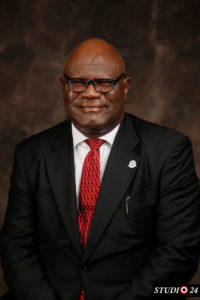
CIIN President, Sir Muftau Oyegunle
According to PwC, “It is a commonly held belief that up to 60% of all compulsory motor vehicle insurance could be fake i.e. issued by unregistered insurance and sold at a below-market price. In 2011, NAICOM, in collaboration with Nigerian Insurance Association (NIA) created the Nigerian Insurance Industry Database (NIID) to serve as the only central record of all insurance policies in Nigeria. As of June 2014, only 2.5 million motor insurance certificates out of about 12.5 million registered vehicles in the country had been captured on the database and can be verified by law enforcement agents through handheld monitoring devices. This fact indicates that about 10 million vehicles operate with either fake insurance cover or none at all. Despite this low level of compliance, statistics in respect of motor insurance business provided by member companies showed an increase of more than 50% over the previous year’s figure especially in third party motor insurance business.”
Poor pricing of insurance products
Citing poor pricing of insurance product as one major thing that hinders the growth of the industry, the former President, Nigeria Council of Registered Insurance Brokers (NCRIB), who is also the Managing Director Scib Insurance Brokers, Mr Shola Tinubu, called on insurers to ensure right pricing of their products.
“Insurance companies are N5 billion, N10 billion, in some cases N20 billion enterprises, they should be able to price their products; they should be able to do what is needful – it’s about research, they have the money to do the research.
“The richest man in the country is Dangote. He is a customer and he will want to get the best from the market. Insurers should be held accountable for their pricing if their prices are not good enough and the shareholders of insurance companies should wake up to their responsibility because it’s their money that is being looted away and send to where they are underpricing or where they are pricing below what is commensurate in that segment of business,” he said.
Low penetration
A recent survey by Price water Coopers (PwC) said the Nigerian insurance industry only contributes 0.7% toward Gross Domestic Product (GDP). This is very low compared to other markets such as South Africa with penetration levels of around 12%, Kenya (2.8%), Angola (0.8%).
“Approximately only 1.5% of all Nigerian adults are covered by insurance today. Uninsured Nigerians face risks and require better mechanisms to mitigate these risks as an alternative to the informal arrangements currently in use. The low insurance penetration in Nigeria is, in part, a consequence of the lack of trust and confidence in insurance companies. A contributor to this perception of the market is the limited knowledge of insurance amongst the public. There is scope to develop a revised market strategy centred on educating the public on the mechanism of insurance and conveying the benefits inherent in its provision culture and slow pace of adoption & enforcement of compulsory insurance may weigh performance going forward,” PwC said in its reports.
The structure of the Nigerian Insurance Industry is set to change in the short term on account of a recapitalisation exercise that is expected to conclude on or before 31 December 2020. Besides the anticipated growth in the industry’s size, Agusto & Co also expects a decline in the total number of operators and significant changes in ownership structure, following the recapitalisation. The Chairman, Nigerian Insurers Association (NIA) and Managing Director, Nem Insurance Plc, Mr. Tope Smart expressed concern over the industry even as he called on insurance industry stakeholders to work together to put the industry in its prime position, saying insurance is the bedrock of the economy.
Insurance not playing its roles well
The NIA boss, who noted that no economy can survive without insurance, expressed concern that the industry is yet to play its critical role as the bedrock of the economy which, according to him. is why the sector is not being taken seriously.
“We should be able to put insurance in its prime position. Insurance is the bedrock of the economy. All these industries can’t survive without insurance. So, if insurance is the bedrock of the economy, then why are we not playing our critical role and not being taken so seriously? So, it is a major concern for me and I think all the stakeholders in the industry must work together.
“My major concern for the industry is that we are not occupying the position we are supposed to be as an industry. A lot of other industries don’t have respect for our industry because we are yet to play a role that is critical and fundamental as an industry.
The NIA boss cited the industry’s insignificant contribution to the nation’s gross domestic product (GDP) as one of the reasons why the industry is not taken seriously.
Low patronage/poor public acceptance
The insuring public has continued to hold insurance with contempt. The average insurer in Nigeria is still perceived by the insuring public as ‘eager to collect premium from the policyholder only to repudiate claims at the slightest opportunity. Many Nigerians have continued to be discouraged from having any form of relationship with insurers. The experience is the same even with insurances that have been made compulsory by law. In particular, in the case of Motor Vehicles (Third Party) Insurance, many motor vehicle owners in practice prefer to patronize fake insurance agents to risking disagreement and, possibly, outright repudiation by the insurer in the event of the happening of the event insured against. This has continued to frustrate genuine efforts by stakeholders to reduce the incidence of fake insurance in the country.
There is an urgent need to heal the psyche of the insuring public in Nigeria and woe them once again to a more cordial relationship with the insurers. In line with the current international practice, the insurance sector in Nigeria should be ready to imbibe the culture of ‘Treating Customers Fairly.’ Treating customers fairly considerations have become more relevant as Nigeria continues to pursue the new economic policy of financial inclusion. In the insurance sector, this policy has translated into the introduction of Micro and Takaful insurances. Typically, these are insurances that are designed for the poor and the unbanked. Many people in this bracket are illiterate and uninformed hence requiring special protection in their relationship with the insurers.
There should be formidable platforms for advocating and protecting the interest of the vulnerable groups in our system in their dealings with the insurers. Insurance policyholders must come together to protect their common interest. Such a platform will enable sustainable awareness and facilitate prompt settlement of genuine claims.
Speaking on this, Mr Smart said, “We have so many insurance products that our regulator, the National Insurance Commission (NAICOM) rolled out but how many people actually take all those covers? Very insignificant, let’s take the example of motor insurance.
“If the Federal Government can help us to enforce the compulsory insurances, such that no car plies Nigerian roads without having the minimum insurance cover of the third party, it will have a huge effect on our industry.
“Also, look at all other compulsory insurances like Group Life, Health Care Professional Indemnity, Insurance of Public Buildings, Insurance of Buildings under Construction and Employers Liability Insurance. We need the government to assist us to enforce all these insurances. If this is done, the industry’s premium will shoot up significantly. This is one angle to it.
“The second angle is that we need to increase our penetration level. For instance, we are far from our target on financial inclusion for the industry. We need to reach the unreached on insurance and educate people to know the benefit of insurance.”

ILAN President, Reginald Egbuniwe
Anybody who has spoken to the average Nigerian about insurance can give a firsthand experience of how Nigerians generally have a negative attitude toward insurance. This accounts for the low patronage of insurance companies in Nigeria.
The negative attitude of Nigerians might not be unconnected to the poor attitude of the insurers as regards non-payment of claims. Some insurance companies are very notorious for defaulting in payment of claims which has adversely affected the publicity for the industry and consequently the confidence in the industry buy the prospective assured.
Some Growth Plans/Initiatives and challenges
Below are some of the growth plans and initiatives introduced by the National Insurance Commission (NAICOM) in partnership with the industry operators aimed at driving the industry growth as well as addressing the identified challenges.
Market Development and Restructuring Initiative (MDRI)
Market Development and Restructuring Initiative (MDRI). The MDRI is a regulator-led market development Plan to expand the width and depth of Nigeria’s insurance market, launched in 2011 (shifted from the initial launch date of 2009).
According to the Chairman, Nigerian Insurers Association (NIA) and the Mandating Director/Chief Executive Officer, Cornerstone Insurance Plc, “The MDRI is aimed at addressing the issue of compulsory insurance products, insurance agency system, fake insurance, functions institutions, and risk-based supervision. The scorecard for implementation is not perfect but there has been some progress. Under the guidance of the new Commissioner for Insurance, I expect that we will see significant progress. The industry is very ready to see the implementation of the next phase of the MDRI. Distribution has been one of the levers we have not fully deployed as an industry, especially to the grassroots. I believe that there will soon be revised microinsurance guidelines to facilitate this. National Insurance Commission (NAICOM) is working closely with Central Bank of Nigeria CBN and Nigeria Communication Commission (NCC) to deliver a more sustainable distributions model that leverages the extensive mobile communication networks.”
The Commissioner for Insurance, Olorundare Sunday Thomas, speaking on the MDRI, said the Commission is rejging it for sustainability. “We believe that MDRI is a good concept, well thought of and put together but we are enhancing it. Part of the enhancement is to get agencies of states involved and get the supply end of the team to be available because we don’t just want to cultivate the demand side but part of the supply side. This is why at one of the fora when I spoke to the industry, I told them they can create a consortium if they think it might not be too profitable for them to have an individual branch. They can come together as a group participating in the premium and risk that may come from that particular area.”
Tier-Based Minimum Solvency Capital (TBMSC) Model
The industry, by a unanimous consensus, agreed to a desirable recapitalization at the Insurers Committee Retreat held on 15th & 16th February 2018 in Abeokuta which led to the introduction of the Tier-Based Minimum Solvency Capital (TBMSC) Model For Insurance Companies.
The “Tier-Based Minimum Solvency Capital” (TBMSC) structure according to NAICOM was introduced as a complementary measure to the ongoing implementation of the Risk-Based Supervision (RBS) programme.
After the introduction of TBMSC, NAICOM as part of deepening insurance penetration also introduced State Insurance Producer (SIP) Policy in September 2018 with implementation to commence January 1, 2019. But these were jettisoned by the industry stakeholders and they were both cancelled and withdrawn.
While TBMSC was cancelled in November 2018 through a circular signed by the Director, Policy and Regulation, NAICOM, Pius Agboola, for Commissioner for Insurance, entitled: Withdrawal of Circular on Tier Based Solvency Capital Policy for Insurance Companies in Nigeria and issued to all insurance companies, which reads: “Under the powers conferred by the enabling laws, the Commission hereby withdraws and cancels the Circular dated August 27, 2018, with reference number NAICOM/DAPCIR/14/2018 and titled Tier Based Solvency Capital Policy for Insurance Companies in Nigeria.”
The SIP was cancelled and withdrawn in December 2018 in a circular signed for the then commissioner for insurance (CFI), Mohammed Kari, by the director, policy and regulation, Agboola Pius, entitled, “Withdrawal Circular” on SIP operational guidelines, with reference number, NAICOM/DPR/CIR/20/2018, dated December 20, and was sent to all insurance institutions.
The circular reads: “Pursuant to the powers conferred by the enabling laws, the Commission hereby withdraws and cancels the Circular dated November 19, with reference number NAICOM/DPR/CIR/17 /2018 and titled “Operational Guidelines on State Insurance Producer.”
The Tier based minimum solvency capital was introduced, according to NAICOM to complement the risk-based supervision where underwriters are expected to take risk according to their capacity so that when there is a claim, they will be able to pay.
The State Insurance Producer (SIP) policy was aimed at enhancing insurance penetration through the encouragement of insurance activities at the states level. But these initiatives were vehemently jettisoned by some stakeholders in the industry who claimed to represent the interest of the investors, citing the timing and lack of proper consultation on the side of the regulator with operators as the reason for their action and this compelled NAICOM to withdraw and cancel the policies.
Recapitalization
The insurance regulator has been working to increase capital in the sector for several years after the 2007 exercise, including proposing a risk-based capital system in 2018 instead of the base capital system. This attempt fell through. The current recapitalisation exercise started in May 2019 when NAICOM said that under new capital rules, life insurers were required to meet a minimum paid-up capital of N8 billion, from N2 billion, while general insurance companies were required to raise their minimum paid-up capital to N10 billion from N3 billion. Composite insurers had to increase their minimum capital from N5 billion to N18 billion, while it increased the minimum capital of reinsurance businesses from NGN10bn to N20 billion. The increase was to have been met by June 30, 2020, for existing re/insurance companies and took immediate effect on May 20, 2019.
On December 30, 2019, NAICOM issued another circular that extended the deadline for recapitalisation to December 31, 2020, following feedback from stakeholders.
In a circular issued on June 3, 2020, NAICOM again extended the deadline and allowed re/insurers to increase their capital in two tranches as follows: re/insurers to meet 50% of the new minimum capital requirement by December 31, 2020, and the remaining 50% by September 30, this 2021.
The National Insurance Commission (NAICOM) has announced the suspension of the recapitalisation exercise for insurers and reinsurers following a court order issued 10 days before the end of the first segment of the exercise which was to have taken effect on 31 December 2020.
Justice CJ Aneke of the Lagos Division of the Federal High Court issued the order on 21 December 2020, pending the outcome of litigation brought before the court by the Incorporated Trustees of the Pragmatic Shareholders’ Association of Nigeria.
Minimum Rate for Group Life Insurance Policy
The regulatory body, NAICOM had in the middle of last 2019 came up with the minimum rate that should be applied in Group Life Insurance product. This has brought a lot of sanity to the Group Life Policies. Our players have adopted the rates stipulated by NAICOM. The Commission stated that the rate was the minimum and operators have embraced it. The members of the public have also embraced it and this is a very positive development. Prior to now, we discovered that many of the liable life schemes were being run at a loss. But with the introduction of this minimum rate, we began to see profits from some of these life schemes which hitherto has not been so before.
No Premium, No Cover
As always of improving insurance growth in Nigeria, in January 2013, NAICOM barred all local underwriting firms from giving cover on credit to their customers in a bid to implement the “no premium no cover” policy provided in the country’s statutory books but not implemented.
Specifically, Section 50 of Insurance Act 2003 states, “The receipt of an insurance premium shall be a condition precedent to a valid contract of insurance and there shall be no cover in respect of an insurance risk unless the premium is paid in advance.”
The ‘no premium, no cover’ policy was expectedly applauded by underwriters. It has recorded some success because it makes the customers to be more serious in paying their premiums in time. This is one initiative well accepted in the industry.
Some Identified Growth Drivers
Under NAICOMs three-year transformation agenda, it is expected that in the next three years, the gross written premium of the industry will triple from 300 billion to one trillion. The number of policyholders is expected to increase from the current number of three million people to 10 million in the next three years. Also, the number of people employed in the industry is expected to move from the current position of 30,000 to 100,000 in the next three years. This transformation agenda supports the Central Bank of Nigeria’s (CBN’s) campaign to raise financial inclusion to 80% by 2020.
According to the Commissioner for Insurance, while speaking on the progress so made by the industry, “You will recollect that in the last three years or so, we have been hovering around N350 billion to N400 billion premium. I believe that in the next two years, we must make a remarkable change. If we cannot hit a trillion in the next two years, we should reach half a trillion. We must hit a 50 per cent increase over what it is now. In which case, we should be talking about N700 billion instead of still dancing around N400 billion which is not progress. That is not my vision. Actually, we should be in the realm of a trillion naira in two years.”

ARIAN President, Kazeem Olakunle Odewunmi
Takaful Insurance
The development and distribution of Takaful insurance products in Nigeria is also being prioritized in the efforts to increase insurance penetration. Approximately 46% of the Nigerian population is Muslim. To fully capture this market it is essential that products that comply with Islamic principles are made available.
Takaful is a type of Islamic insurance wherein members contribute money into a pool system to guarantee each other against loss or damage. Takaful-branded insurance is based on sharia or Islamic religious law, which explains how individuals are responsible to cooperate and protect one another. Takaful policies cover health, life, and general insurance needs.
Need for Government Support/Enforcement of Compulsory
On the initiatives on compulsory insurance, NIA Chairman, Ganiyu Musa said: “We have commenced discussions with Lagos State Building Control Agency as part of engagements on the implementation of Lagos State Building law. We are also working closely with the state vehicle Inspection service on enforcement of Third Party Motor Insurance in the state. We are also engaging Kaduna, Kogi and Ogun States, and remain hopeful that other states will see value in the platform and embrace it. Out of the estimated 13 million vehicles in Nigeria, only about 2,939,767 Third Party Motor policies are in force as at (Apr 26, 2021).”Insurance
Meanwhile, the former Chairman, Nigerian Insurers Association, and Managing Director, NEM Insurance, Mr Tope Smart, had while speaking on the matter said “So many things can be done to achieve insurance industry’s growth. The first thing is that we need the support of the government because we lack adequate support from the government. As we all know, Government is the biggest spender in any economy and we need government not only to insure all the assets of the government but they are also enforce to compulsory insurances.
“We have so many insurance products that our regulator, the National Insurance Commission (NAICOM) rolled out but how many people actually take all those covers? Very insignificant. Let’s take the example of motor insurance. The statistics available is that about 11.7 million vehicles were on the road as of 2019. Out of the 11.7 million vehicles, statistics also revealed that only about 2.5 million of those vehicles had any form of insurance or the other. So what happens to the other 9.2 million vehicles that were not insured. If the Federal Government can help us to enforce the compulsory insurances, such that no car plies on the Nigerian roads without having the minimum insurance cover of the third party, it will have a huge effect on our industry. Also, look at all the other compulsory insurances like Group Life, Health Care Professional Indemnity, Insurance of Public Buildings, Insurance of Buildings under Construction and Employers Liability Insurance. We need the government to assist us to enforce all these insurances. If this is done, the industry’s premium will shoot up significantly. This is one angle to it.
The NAICOM boss, Mr Thomas, while emphasizing the need for professionalism in the enforcement of compulsory insurance said “We must do this in the way that will still identify the fact that there is difference between regulation and the job of the law enforcement agencies. We are the regulator and we have a responsibility for sensitizing the relevant enforcement agencies. But we must do this in a way that will still identify that there’s a difference between regulation and the job of the law enforcement agencies. For example, NAICOM cannot go and say they are checking license or any other vehicle particulars. But it can sensitise the relevant agencies by collaborating with them to do just that. All these things we tend to do as part of our awareness creation. It is going to be on a sustainable basis.
Introduction of NIID/NIIP
Speaking on the Nigerian Insurance Industry Database /Nigerian Insurance Industry Portal (NIID/NIIP), Musa said: “The Nigerian Insurance Industry database was established to reduce soft market practices and eliminate fake insurance policies. The Association has taken a step further by creating the Nigerian Insurance Industry platform to enable vehicle owners to purchase their third-party motor vehicle insurance cover from the comfort of their homes and telephones. So far, we are seeing a lot of traction on the platform across the states of the Federation and we are hopeful that other states will key into the project before the end of the year.”
On the Marine Module, he said: “As you are probably aware, the Central Bank of Nigeria has since integrated the NIA Marine Module into the National Trade portal and all insurance certificates required for import and export are generated from the Portal. This, no doubt, signals the end of fake Marine Insurance Certificates at the Ports.”
Insurance Penetration/Awareness
The industry in collaboration with NAICOM has continued to intensify its awareness campaign.
According to Tope Smart, MD/CEO Nem Insurance, “We need to increase our penetration level. For instance, we are far from our target on financial inclusion for the industry. We need to reach the unreached on insurance and educate people to know the benefit of insurance. As I speak with you now, not many people know the benefits of insurance. About five years ago, an elite called me and said he just bought a vehicle of about N10 million and asked me for the rate of third party motor insurance. I was surprised that he asked to have a third party cover on a vehicle of N10 million. I told him I couldn’t do that for him as his friend but he said nothing was going to happen. I insisted by advising him to take a comprehensive cover on the vehicle. By the time we calculated how much premium he needs to pay to secure the vehicle if he does comprehensive, it was about N500,000. You can imagine that even the elite that is expected to know does not know the benefits of insurance. So we need to educate people about the benefits and by the time we do this and marry it with all the other factors, I believe that the industry can actually hit the N1 trillion target.
According to the Commissioner for Insurance, “With little enforcement that is being done on motor insurance for example many are coming into the net. Of course, we need to do much more than we have ever done before because the number has changed significantly. You will recollect that we have been hovering around N350 billion to N400 billion premium in the last three years or so. I believe that in the next two years, we must make a remarkable change. If we cannot hit a trillion in the next two years, we should reach half a trillion. We must hit a 50 per cent increase over what it is now. In which case, we should be talking about N700 billion instead of still dancing around N400 billion which is not progress. That is not my vision. Actually, we should be in the realm of a trillion naira in two years.”
Dealing with Unethical practices
Mr Ganiyu Musa speaking on what NIA is doing to eradicate the above-mentioned practices in the industry said, “As an association, we have a mechanism we have put in place to encourage members of the public to report companies that are not fulfilling their obligations to them to the association. We have an internal mechanism through which companies that fail to honour their obligations are put in check. We try to come in to mediate between some of these companies and the policyholders to ensure they live up to expectations.
Building trust/public confidence
Since these are essential to the industry growth, Ganiyu Musa said NIA is working with NAICOM to see how they can intervene where some of our members do not play by the rules.
“We also encourage members of the public to report companies that are not fulfilling their obligations to them to the association. We have an internal mechanism through which companies that fail to honour their obligations are put in check. We try to come in to mediate between some of these companies and the policyholders to ensure they live up to expectations,” he said.
Eradication of Fake Motor/Marine Insurance certificates
According to Mr. Smart, “We started the Nigerian Insurance Industry Database (NIID) and the Unstructured Supplementary Service Data (USSD) Code *565*11# project some years back in order to arrest fake Motor/Marine Insurance certificates. Of course, many people didn’t know their insurance certificates were faked because some touts just give them one dead insurance company’s name and issue a certificate.
The people most times only get to know when there’s an accident or something before they realize such companies do not exist. This is why we introduced the NIID to be able to check the activities of the parallel market and it has worked for us. It has its own limitation and one of the limitations of NIID is the lack of network to operate. You need to have a network on your phone for it to operate, otherwise, it will not work.
This led us to adopt the USSD that was recently launched to address the challenge. It does not require a network and it is more robust and people have embraced it. It has a facility for you to check your insurance’s validity and check the renewal date. They are excited about the particular model we are working with and because of the excitement; we have seen that we have equally moved to marine.
Presently, we are appealing to all our members to upload their marine certificate businesses online so that we will be able to verify because it is the same challenge that we have with the motor insurance certificate that we have in Marine. We found that many people use the fake marine certificate to clear their goods and import. We are working with the customs and port authorities to ensure that they key into the project too so that we can have sanity in the sector.
Entrenchment of professionalism
Many top executives in the insurance industry are marketers who have rose through the ranks not because of their strong technical background of the industry but because of their distinctive salesmanship and the ability to bring in more clients than the others. The author thinks bringing in the client should be a major requirement of promotion, however, the combination of a good technical background and business skills should be the pre-requisite. Many marketers out there would give any rate to the prospective assured, not looking at important factors such as claims history and other major factors.

#EndSARS Protest in 2020
Speaking on this issue, the Chairman, NIA, said “We recently held a retreat where we brainstorm and put some ideas together. First, we want to introduce the concept of professionalism and we want it entrenched. We discovered that some players don’t play by the rules and have abandoned professionalism just to get business. We want to entrench good ethics as part of the things that will move the industry forward. We have talked about low penetration level.
Establishment of Insurance Academy
As part of building capacity among regulators, the National Insurance Commission has established Insurance Academy. The academy, According to NAICOM boss is to bridge the existing manpower gap in the Commission.
“We believe this should be able to bridge some gaps. The second one is a skill, which is the reason why we are establishing the Academy. This will pump knowledge into the head of the staff. They will know of current developments and will be conversant with our responsibilities. We believe the Academy should be the game-changer.
“The Academy essentially is to train regulators, just as the market is bereft of human capital, we also have capacity issues. And so we found out it is cheaper for us to bring somebody from the United States and more developed insurance regulatory jurisdiction to train 20 or 30 people than to send 10 abroad. I think for us it is more economical and, above all, knowledge sharing on a continuous basis. So, it is one of these things we want to do as frequently as possible.”
Micro Insurance/financial inclusion
According to the Commissioner for Insurance, Sunday Thomas, “Microinsurance is one of the areas we want to fast track the process. We have a couple of applications that we should be able to conclude soon. One thing is for you to initiate something; another is for others to see the viability of the vision. We have this but people seem to be catching up with us in terms of our vision and their understanding of these vision. For us, micro-insurance in financial inclusion generally is the way to go. Financial inclusion is going to help us and it is going to drive penetration. I believe that with the way we are going about it, things will get better. We are trying to rejig the entire guideline to be more realistic. What we have before in the guideline issued about six years ago was the National, State and Unit licensing of microinsurance companies. The amount of capital required for this with respect to some of the sectors is not looking unrealistic and we may have to thinker with it.
Enhanced database
“This has been one of the issues faced by the industry. There are two things we are doing to rectify this. Firstly, we have an industry transformation roadmap for the next 10 years and developing our Information and Technology (IT) infrastructure to support collective data management is a key pillar. Secondly, the recapitalization exercise will mean that insurance companies will have the capital to invest in the technology to support data management,” Said Mr Ganiyu Musa.
Meanwhile, speaking on the topic “Future of insurance in 2021” at the virtual training for insurance journalists organised by Leadway Assurance Company Limited, Mr Akinyemi Alebiosu, Principal Investment and Strategy, Leadway Assurance Limited, said that underwriting in the future is going to be driven by data.
According to Alebiosu, if companies have proper data, they can predict incidents of loss and properly price it.
He said: “Data is the new oil and underwriting in the future is going to be driven by data and analytics. We are getting to a point where we will be using historical records, using robotics, artificial intelligence in making decisions of pricing, type and extent of risks we take.
“Insurance companies of the future will seek to collect large pools of data, analyse it, try to make meaning of it, prepare or create predictive models, at the end of the day make decisions that will make the product better. For example, in analysing the data, I want to know the pain point of our customers, what is their biggest concern, how am I able to create products that meet these needs at the lowest cost because if I have proper data I can predict incidents of loss and properly price it and also know what their price point is. So at the end of the day, if we use data and analytics correctly in our underwriting process, the customer will be happy, the underwriter will be happy and all the stakeholders will benefit from the insurance ecosystem.”
Adoption of other distribution channels
“We are close to it. The Central Bank of Nigeria (CBN), the Nigerian Communication Commission (NCC) and NAICOM have been meeting. Essentially, CBN and NCC and, of course, occasionally NAICOM is brought into the discussion and we are close to resolving the matter. I must also sound a note of warning that technology will not automatically translate to efficient service delivery in the sense that financial inclusion requires attending to the needs of the lower end of the pyramid. But how many people are actually transacting business using technology? The majority of them still try to go to banks. In which case, brick and mortar is still very relevant. Even as popular as banking is, you still find banks opening branches around despite being technologically driven.” Sunday Thomas said.
Adoption of technology
Insurance operators are embracing technology to boost customer service delivery which is a positive development. A number of products are sold online as opposed to the situation in the past. Customers can now buy an insurance policy and pay from the comfort of their homes. Secondly, most insurance players now live up to expectations such that we experience minimal delay in the payment of claims. Operators have stepped up their games in trying to delight their clients. All of this will impact the industry positively in Nigeria.
Speaking on the level of adoption of technology in the industry, NIA Chairman, Ganiyu Musa said, “I was genuinely worried about the impact the virus and the lockdown will have on our customers and our business. The truth, however, is since the outbreak of COVID-19, we have all adapted so well. The use of technology has been the main lever of our adaptation. The Annual General Meeting (AGM) of the Nigeria Insurers Association (NIA) where I was inaugurated is a great example of this. If anyone suggested a year ago that we could hold a virtual AGM, we would all wonder about how this would work but it did and life moves on. We have been holding meetings online and sharing documents electronically. Many of us have become experts in using all these tools and gadgets and I haven’t seen any downturn in output from all the committees and bodies I am a member of. So in summary, as much as the pandemic has introduced some challenges, it has not diminished our capacity to strive towards our goals.
Licensing of new insurance companies
Six new insurance firms and one reinsurance company have been issued operational licenses by the National Insurance Commission (NAICOM) to ensure a stronger industry.
The new firms are Heirs Insurance Limited (General); Stanbic IBTC Insurance Limited; Heirs Life Assurance Limited; Enterprise Life Assurance Company Nigeria Limited; and FBS Reinsurance Limited, Salam Takaful, and Cornerstone Takaful Insurance Co. Limited.
Heirs Insurance Limited (General) has Mr Olaniyi Stephen Onifade as its Managing Director; Mr Akinjide Orimolade, Stanbic IBTC Insurance Limited; Mr Abah Okoriko, Heirs Life Assurance Limited; and Mrs Fumilayo Abimbola Omo, Enterprise Life Assurance Company Nigeria Limited.
FBS Reinsurance Limited is to be led by the former Commissioner for Insurance, Fola Daniel, along with other seasoned professionals from the brokerage and underwriting units of the industry like Bala Zakariyau, the former Managing Director of Niger Insurance, Ahmed Olaniyi Salawu of the Standard Insurance Consultants, and Wole Oshin of the Custodian Investment Plc.
The Way Forward
Although the industry is evolving but there is more to be done. For the industry to play its part effectively as well as contribute significantly to national development, there is a need for all the stakeholders including NAICOM (government representatives), insurance operators, sub-regulatory bodies/intermediaries, educational arm, such as the Nigerian Insurers Association (NIA), Chartered Insurance Institute of Nigeria (CIIN), The Nigerian Council of Registered Insurance Brokers (NCRIB), Institute of Loss Adjusters of Nigeria (ILAN), Association of Registered Insurance Agents of Nigeria (ARIAN) and various Shareholders Associations to come together to ensure the growth of the industry.
The Federal Government must also examine the extant legislation on insurance in Nigeria. Particularly the Insurance Act 2003 and the National Insurance Commission Act 1997. The Insurance Act must also be well implemented by NAICOM or any other government institution saddled with such implementation responsibility. For instance, Section 64 of the Insurance Act makes compulsory insurance of building under construction which is more than two floors. The general implementation of the Insurance Act has left more to be desired. The limitation of liability on third party insurance is too small in line with the present-day economy. Several sections of the insurance Act have also been badly implemented. We cannot overemphasize the need for adequate legislation and policy to create an operational environment.
The formulation of economic policies which will give room for investment will also help the insurance industry. Where there are investment-friendly policies, insurance companies would also be able to make long term investment for better returns on such investments. Also, it is noteworthy of stating that if the economy is in better shape, the prospective insured will have the liquidity to procure insurance.
Customer services in the insurance industry are below par. Many of these companies are having problem satisfying their customers in terms of product offerings, quality of services and sophistication of products offered. Customer service is clearly important for winning new customers and retaining existing ones. The first step of changing the face of the industry is ensuring an exceptional customer experience. Insurance companies must find a way to provide customers with an internet-based self-service insurance platform where customers can view policy coverage, pay bills, make changes to policies, submit claims and check the status of claim progress. Brokers should be able to obtain online quotes, proposal and plans, design for their customers.
Employing more adequate staff with related professional background is also key. It is also important that the Chartered Institute of Insurance (CIIN) must regularly review and expand its curriculum to meet the present market need and build the capacity of student members.
Insurance companies must also allocate a percentage of their budget to Continuous Professional Development to keep staff abreast of professional standards and practices.
Insurance companies must also find ways to sensitise the populace about the use of insurance. The government also has a role to play in this by making relevant laws that will help make certain insurance policies compulsory and harsh sanctions for non-compliance of same.

Scene of destruction during #EndSARS
Generally, around the world, there is a paradigm shift from the paper-oriented process which is a manual to an automated process. Insurance companies in Nigeria must follow this growing trend. Insurance companies must employ the expertise of first-tier technology firms to develop software to increase operational efficiency.
Conclusion
The industry needs adequate government’s support especially on enforcement of compulsory insurances. Government is the biggest spender in any economy and we need government not only to insure all their assets but also enforce compulsory insurances.
People need to be educated on the benefits of insurance because not many people are aware of the values and benefits of insurance therefore the industry needs to raise the bar of its sensitization programmes. This should not be concentrated only in the urban areas, it should also be taken to remote areas of the country as this will help tremendously in deepening insurance and encouraging adoption.
While introducing products, consideration should be given to such products that address the basic needs of the populace.
The industry should ensure full implementation of the Market Development and Restructuring Initiative (MDRI) introduced in 2009 by the former Commissioner for Insurance, Mr Fola Daniel as machinery for enforcement of the six compulsory insurances out of the 16 insurance policies in the country’s statutory laws.
While entrenching professionalism in all segments of the industry’s operations, operators should engage in growth-driven competition, not such that is counter-productive and inimical to the industry’s growth.
The regulatory framework should be in tandem with the peculiarity of the Nigerian environment and its economy and regulatory authority should always engage all relevant industry stakeholders for their inputs and contributions before taking the final decision.
Also, various shareholders associations representing investors’ interest in various insurance companies should understand why there is a need for the industry to be recapitalized so that the lingering recapitalization imbroglio can be resolved in order to move the industry forward.
Beyond restoring insurance industry confidence, there is a need to further deepen insurance penetration in Nigeria through a massive public awareness drive. The insurance sector must rise up at this time, to exploit Nigeria’s huge population to advantage. The sector can borrow a leaf from countries like India, Brazil and others with similar population advantage. Massive grassroots sensitization for Nigeria has become inevitable.


